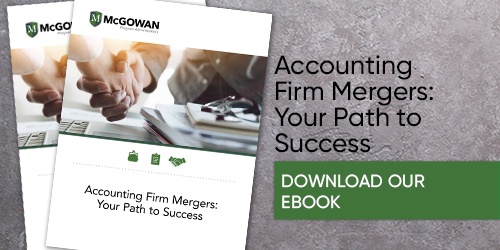Accounting firms are experiencing increased Mergers & Acquisitions (M&A) due to the current economic climate, concerns around succession within firms, and chronic staffing shortages. Ultimately, when done right, a merger or acquisition can significantly benefit both parties.
Sales or mergers can be a great solution for complex business challenges. A sale occurs when one company purchases another company’s tangible or intangible assets outright, including intellectual property or divisions. A merger occurs when two business entities combine into a single legal entity. The resulting entity retains the assets of each company.
This blog will cover everything you need to know about preparing for accounting firm mergers as a buyer or a seller.
What is causing the increase in accounting firm mergers?
The accounting profession has become increasingly competitive. Today, small firms are expected to provide a wide range of services, advising on everything from cryptocurrency to international trade. The result is that small firms cannot offer everything at the highest quality, meaning that they are struggling to match the expertise and workforce available to larger firms.
Additionally, smaller firms are at risk of challenges with succession. As partners in a small firm age, concern grows around whether the firm can retain or find the right talent and secure retirement for the aging partners. This challenge, combined with today’s widespread staffing shortage, creates a climate where smaller firms can’t succeed.
In both cases, merging with a more prominent firm is a strong choice as it turns the limited capabilities of a small firm into a unique selling point that can be added to a buyer’s expanding catalog. It gives smaller firms the benefits of a larger talent pool while securing leadership’s retirement. Approached in this way, accounting firm mergers can benefit both parties.

How complex is a merger?
Accounting firm mergers are among the most complex situations all parties will deal with. They involve many stakeholders and require intense preparation, analysis of finances, and complicated contracts.
Buyers and sellers should consider bringing in an M&A lawyer for support as early as possible. Lawyers can assist with advice on:
- Appropriate financing
- Tax implications
- Deals and negotiation tactics
- Drafting and performance of contracts
As mergers are one of the most significant events in a firm’s lifespan, all parties must get it right. A team working to ensure the health and legality of the accounting firm merger can make all the difference.
Also read: Remote Access Security Risks: What CPAs and Accountants Need to Know
How should buyers and sellers prepare?
The role of the seller is to make the firm as attractive as possible for a potential buyer. This involves upgrading technology to be as modern as possible, ensuring that staff is strong and capable, that there is a deep understanding of the firm’s financial situation and performance metrics, and that the firm is committed to quality service.
For buyers, the situation is more complex, as they must ensure the happiness of many stakeholders throughout the deal. There are four things they should keep in mind.
- Customer satisfaction. There should be plans to secure customer retention, improve customer experience, and provide effective communication of those changes and benefits to customers.
- Staff capabilities. Buyers need a thorough understanding of the strengths and weaknesses of both the buyer and seller’s workforce. This will allow buyers to decide on retaining or re-recruiting personnel.
- Defined culture. A merger is a mixture of two often highly different cultures. To be effective, the buyer needs a deep understanding of its own values and ideals. From there, it can identify where there is friction and overlap.
- Total transparency. As questions are expected during accounting firm mergers, buyers should be as prepared as possible. By being transparent, buyers can get ahead of questions that may otherwise be answered incorrectly and harm the union.
Also read: Third-party Claims Against CPAs and Accounting Professionals
How to ensure the success of accounting firm mergers
Due to complexity, accounting firm mergers can fall apart before reaching the finish line. However, there are a couple of rules that will help guarantee success.
All parties should benefit.
If the deal is lopsided, with only the buyer or seller standing to gain from the merger, then there will likely be friction as the deal progresses. If there is too much pressure on the seller, this could result in a disconnect with the new team, causing staffing issues, loss of clients, or an end to the merger.
Have the right goals in mind.
Access to a broader talent pool, increased economies of scale, a new marketplace or region, or planning for succession are all valid reasons to seek a merger. On the other hand, entering negotiations simply because of the belief that bigger is better won’t result in a positive experience—unless both firms are already set up to capitalize on the benefits of scale.
Cover all your bases
Ultimately, mergers must meet the original objectives of the deal on a strategic, professional, and financial level. By understanding the marketplace, having a robust legal team, and communicating effectively with teams, all parties set themselves up for success.
Download our e-book to learn more:
Also read: Accounting Outsourcing Risks: What Accountants & CPAs Need to Know
Insurance coverage that protects your firm
Accounting firm mergers have the potential to solve complex, modern challenges like staffing shortage, succession planning issues, and lack of resources or niche expertise. Unfortunately, they are not without risk.
McGowan Program Administrators has decades of experience providing highly specialized professional liability insurance policies. Our Accountants E&O Insurance policy is designed to provide you with extensive, affordable coverage—notably featuring tail coverage so that your firm doesn’t have to worry about litigation in the months and years following the merger.
Contact us today to learn more about how comprehensive coverage will benefit you during a merger.


